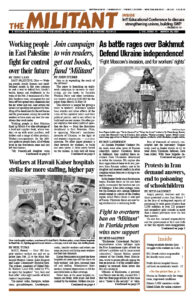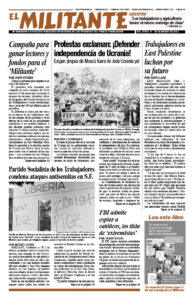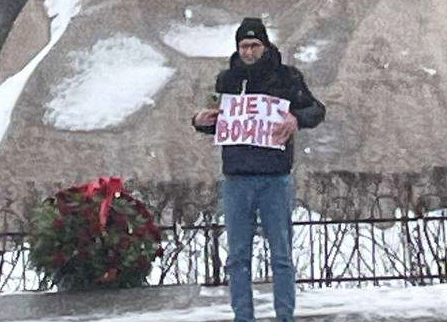As Russian President Vladimir Putin sends wave after wave of Russian conscripts against Ukrainian forces in Bakhmut, they confront fierce resistance from Ukrainians determined to defeat the invasion. His regime also faces opposition at home to its war, protests from Russian soldiers sent to the slaughter and renewed conflicts in other countries where Moscow is trying to extend its sway.
In the longest battle since the invasion began, Russian forces in the east have partly surrounded the bombed-out city of Bakhmut. It has little strategic value, but the Kremlin says seizing Bakhmut would extend its control of the Donbas region, which Putin claims is now part of Russia. Ukrainian forces are now being reinforced in a continuing battle.
Tens of thousands of convicts conscripted into the mercenary Wagner army, used in frontal attacks to try to wear down Ukrainian defenses, have been killed. With these brigades depleted, the outfit’s elite forces have been ordered into battle alongside the conventional Russian army.
“The enemy would send 20 guys into attack six to seven times a day,” Oleksandr, a Ukrainian company commander, told the New York Times. “They don’t care about men.”
“Even in Russia, they don’t have enough men who seek suicide on our land,” Ukrainian Lt. Vladyslav, whose company is part of defending Bakhmut, told the Wall Street Journal.
In a three-week battle in February, Moscow’s invading forces failed to capture the coal mining town of Vuhledar, 90 miles south of Bakhmut. The biggest tank battle of the war so far saw some 130 Russian tanks and armored personnel carriers destroyed.
“What they did wrong was come to Ukraine,” tank crew member, Dmytro Hrebenok, 20, said. Without any formal training on armored vehicles, the Ukrainian volunteer learned from practice “gained in the field.” Like tens of thousands of volunteers, mainly from the working class, he’s determined to do what’s necessary to defend his country’s independence. In contrast, Russian crews are mostly conscripts ordered to invade another country and to try to subjugate its people.
A group of Russian soldiers sent a video to Putin denouncing the military command’s conduct of the war after their huge losses.
Unionists in Ukraine face attack
Many union members have been “mobilized into the Armed Forces of Ukraine. They are on the frontline of defense,” Pavlo Holota, from the Independent Union of Mineworkers of Ukraine, told the Ukraine Solidarity Campaign March 4. The union is helping get supplies to its members at the front.
The Putin regime “seeks to destroy Ukraine as a state and Ukrainians as a nation. To destroy our culture and our history,” Holota said. “Victory over Russia is a top priority, but we cannot remain silent about the problems of the workers either.”
In September, Holota helped lead a miners strike in Novolynsk, in the west, the first major action by workers since the invasion. Capitalists and their government are pushing laws that undercut workers’ rights in Ukraine to try to blunt their ability to fight nonpayment of wages and unsafe conditions. Ukrainians are “united with other peoples around them,” Holota said, pointing to Putin’s expansionist course. If Moscow “will conquer Ukraine, it will not stop.”
Thousands protested in Tbilisi, Georgia, March 7, chanting “No to the Russian law,” after parliament began debating a law that would force some organizations to register as “foreign agents.”
“We don’t want to be part of Russia again,” Demetre Shanshiashvili told Reuters at the Tbilisi protest, referring to the two centuries Georgia was oppressed in the czarist prison house of nations. In 2008 Moscow invaded again, seizing a fifth of the country.
The impact of Moscow’s invasion of Ukraine continues to shake the capitalist world order. At a Feb. 23 U.N. vote on a resolution demanding Russian forces leave Ukraine, 141 nations voted in favor. The governments of 32 countries abstained, including China, India, Vietnam and Cuba, as well as the Central Asian republics. In the “no” vote, Moscow was joined by Belarus, North Korea, Syria, and three others.
President Joseph Biden met German Chancellor Olaf Scholz March 3. The White House said Washington and Berlin are in “lock step” in backing the Ukrainian government. But, in fact, both of the imperialist rivals have sought ways to induce Kyiv to cede territory to Moscow in order to end the conflict.
Inside Russia individuals continue to hold placards opposing the invasion, despite Putin’s clampdown and arrest of thousands of anti-war protesters. Recently they’ve been joined by people in over 200 cities that have hung thousands of green ribbons, anti-war symbols, in public places. One organizer said the ribbons helped to show those opposed to the war that “there are a lot of us.”


